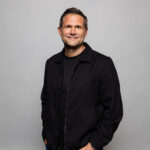Let me tell you about one Sunday morning in 2017. I was standing on the front row of our church service, singing a worship song, minutes away from going up to preach. I realized in that moment that I felt nothing. By nothing, I mean …
· I didn’t feel God’s presence.
· I didn’t feel like preaching.
· I didn’t feel like I had any faith.
Panic erupted in me, as I thought, What if all this isn’t real? What if it’s all just been emotions? Some say religion is just a crutch; what if they’re right?
I felt as if someone had knocked the breath out of me.
I wondered if the people near me could hear my heart pounding, because I was sure it was louder than the music.
I started shaking.
I began to cry.
That’s when I noticed the exit sign.
I thought, Maybe I could just leave? Just walk right out of church.
The reality is that, for quite a while now, a lot of people have had those same feelings, those same questions, and been heading for the exit, walking out of church. And they’ve not returned.
Why are people leaving?
I think most don’t have a problem with Jesus. He’s hard not to like.
Instead, they have questions but feel like they can’t ask them, so they’ve found no answers.
Yet, there are answers. But many people don’t feel safe asking. They want to, but they’re embarrassed or ashamed or insecure, thinking, What if I’m the only one? What will people think of me? They’re afraid, and church may not seem like the safest place to express their doubts.
Some of those who have mustered up their courage and finally asked their questions have, too often, been met with bumper-sticker theology that dogmatically states, “The Bible says it. I believe it. That settles it.”
Thanks.
Thanks a lot.
Many are left wondering whether there are any answers at all. And then, just as I did, they noticed the exit.
Perhaps doubts have left you wondering.
What do you doubt?
It’s an important question because, until you get clarity about what you’re doubting, you’ll feel confused instead of getting answers that can satisfy you.
While you’re pondering what you doubt, you may also want to assess why. What’s lurking behind your doubt? Consider the why behind the what.
Let’s look at some common dynamics that can be the source:
· Doubts may be driven by circumstances.
We may hate what’s happening and feel like there’s no way a good God would allow something so bad, which leads us to wonder if maybe there is no God or he’s just not as good as we were told.
· Doubts may be driven by intellect.
I’ve found people are especially vulnerable to intellectual doubts if they don’t know why they believe what they believe. Then when one day a friend poses a question or a teacher belittles what they believe, suddenly there’s a fissure in their faith and the foundation starts to falter.
· Doubts may be driven by emotion.
We may realize our faith is built almost entirely on feelings. Perhaps there is a euphoric experience when a person comes to Jesus. After being emotionally pumped for a bit, eventually, that spiritual high began to wear off. Now panic sets in and the questions come: Is my faith disappearing? What if I was never really a Christian in the first place?
· Doubts may be driven by other people.
Maybe someone has been around some hypocritical Christians. Maybe a pastor who was loved and respected fell morally, or a dad who supposedly loved Jesus until an affair came out. So the person decides, “If that is what Christians are like, then I think the whole thing must be a joke.”
· Doubts may be driven by a relationship with an absent or abusive father.
If you look at the most famous atheists of all time, many of them had absent or abusive fathers, including Karl Marx, Sigmund Freud, Bertrand Russell, Jean-Paul Sartre, Frederick Nietzsche, and Albert Camus. I get it. I bet it’s easy to conclude, If this is what earthly fathers are like, I sure don’t want a heavenly father!
· Doubts may be driven by personality.
Some people are just naturally more cynical or contrarian. That can make it more challenging to have faith or easier to rebel against a family or a culture founded on faith.
· Doubts may be driven by decisions.
When Christians make deliberate decisions to sin and keep sinning, they’ll feel further and further from God. Why? Because sin separates us from God. Then this person is upset because God seems distant and may start to wonder, Where is God? Why don’t I feel his presence? Is he even real? But the issue is not with God. It’s with the choice to stubbornly cling to sin.
Did any of these resonate with you? The “why” behind the “what”?
Our doubts cannot be diffused until they are defined.
If you don’t know what’s behind your doubt, you may never experience the benefit of your doubt.
So, what is your doubt all about?
What do you doubt, and why?
Take a moment to objectively and honestly face your doubts and your hurts.
Don’t be afraid to press into your emotions.
Don’t be scared to ask your questions.
Don’t hold back.
Whatever your doubt, and whyever you doubt, I want you to know that, despite the impression you got from a parent, a pastor, or a Mr. The Bible Says It So That Settles It, doubt is normal. Everyone doubts. Doubt is part of the human experience. And, yes, doubt is even a part of faith.
We’re going to talk about how doubts don’t have to take you away from God. Your doubts can actually draw you closer to him.
Some think of faith as a destination, as in, Someday I will arrive. I’ll have graduated. Like those perfect people who don’t struggle with doubts the way I do. Someday I’ll have perfect faith too.
No.
Faith is a journey. You don’t arrive. You’ll never understand it all or move beyond having questions. The strongest faith isn’t a faith that never doubts. Rather …
The strongest faith is a faith that grows through doubts.
Digging Deeper Into Doubt
As you consider how your doubts can invite you to a richer relationship with God, it might be helpful to examine the basis for your doubts. With this goal in mind, use the following categories and questions from The Benefit of Doubt Workbook to help you assess what’s attached to the doubts you hold.
Doubts Based On Circumstances, Past Experiences, And Emotions
· How have your most painful losses and disappointments contributed to the doubts you have? What questions do these experiences raise?
· What recent personal circumstances tilt you toward doubting? What feelings and assumptions emerge when these doubts arise?
Doubts Based On Intellect And Ideas You Hold
· Generally, are you persuaded more by rational evidence or by your feelings and intuition? How does this tendency affect your spiritual doubts?
· What are some of the questions and concerns you have about the Bible? How do these influence your willingness to rely on it as your source of God’s truth?
Doubts Based On (And Inherited From) Other People
· Which family members have most influenced your views on God, faith, and Christianity? What role have your friends played in your beliefs or doubts?
· Which pastors, teachers, and leaders have had the greatest impact on your faith? What did you learn about the role of doubt from them?
Doubts Based On Misperceptions And False Assumptions About God And The Bible
· What image of God did you form while you were growing up? What was the basis for this image and perception of him?
· How has your relationship with your parents or early caregivers influenced the way you see God now? What false assumptions and biases might have arisen because of this?
The Benefit of Doubt book and workbook release from Zondervan and HarperChristian Resources on February 18, 2025.
New York Times bestselling author Craig Groeschel is the founding and senior pastor of Life.Church, which created the free YouVersion Bible App and is one of the largest churches in the world. He has written more than 15 books and hosts the top-ranking Craig Groeschel Leadership Podcast. He speaks regularly for the Global Leadership Network, which reaches hundreds of thousands of leaders around the world annually. Craig and his wife, Amy, live in Oklahoma. Connect with Craig at www.craiggroeschel.com.
















0 Comments